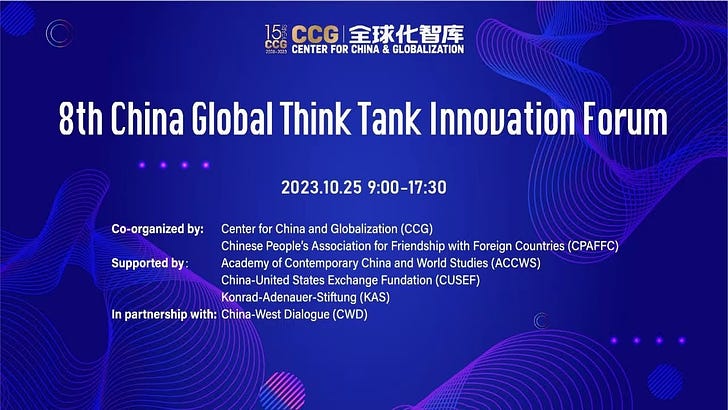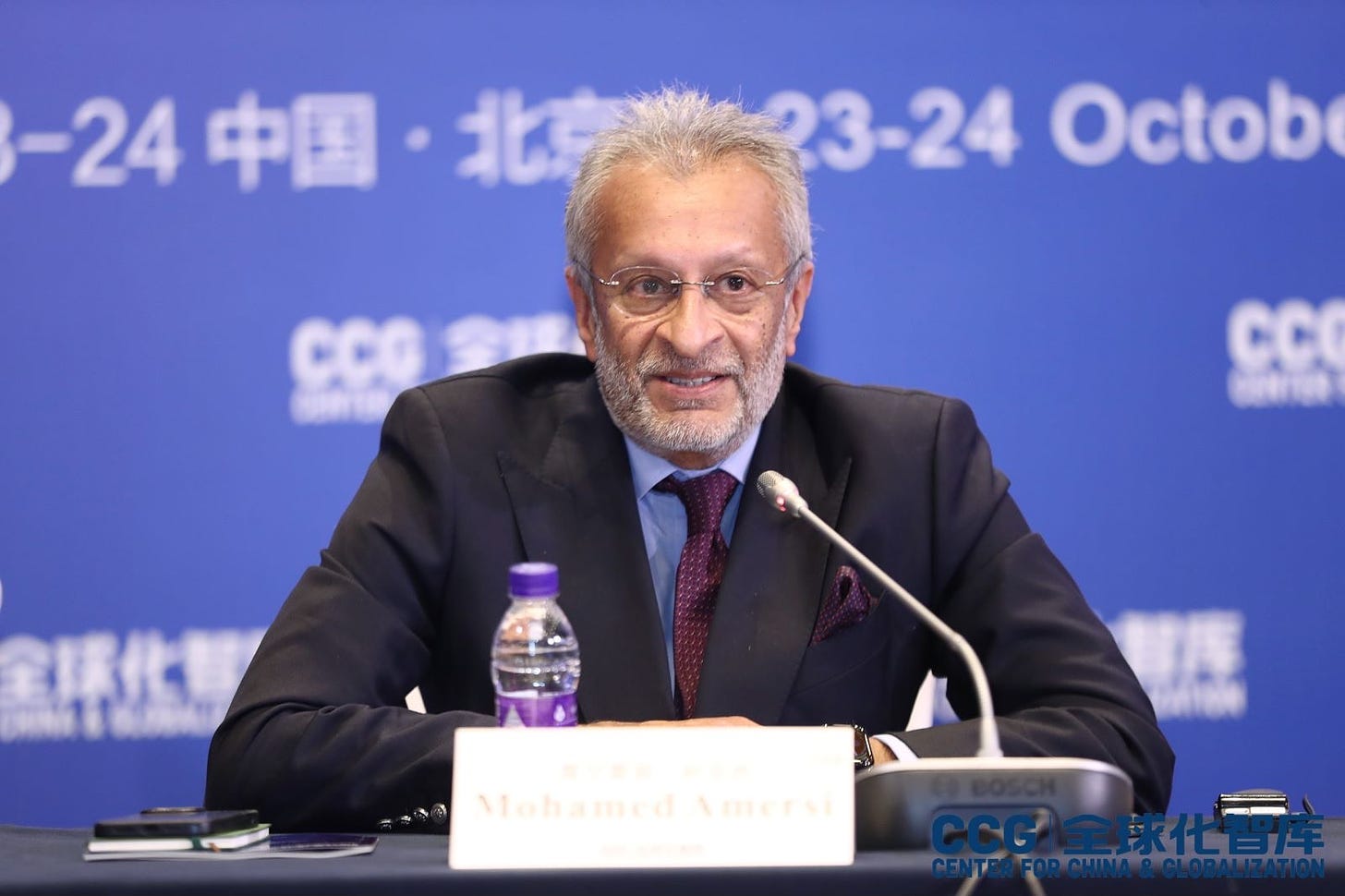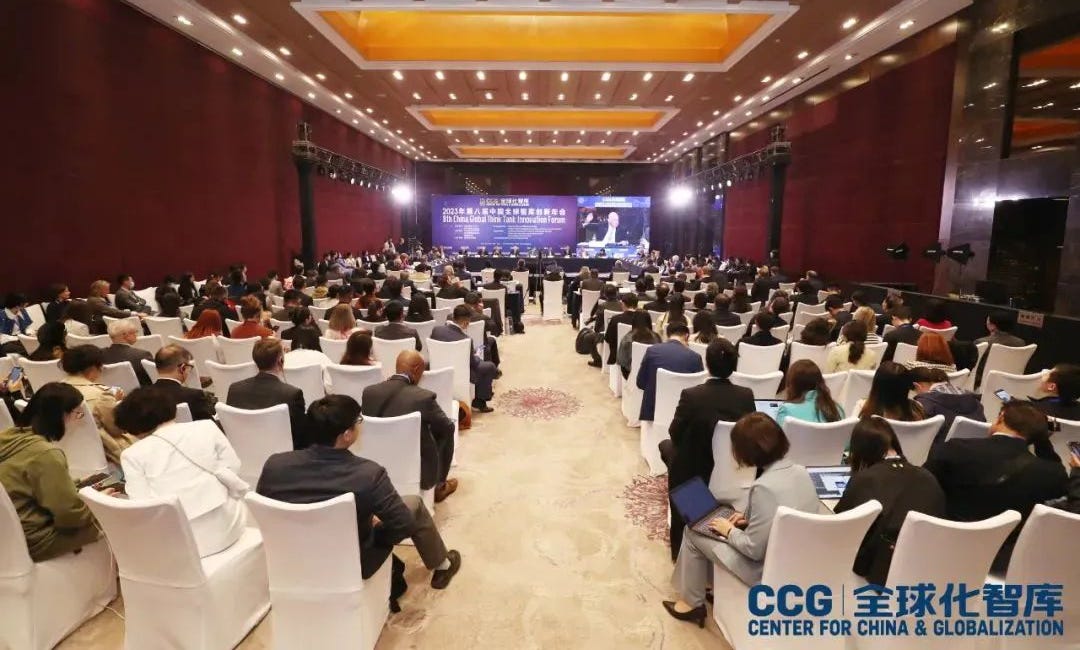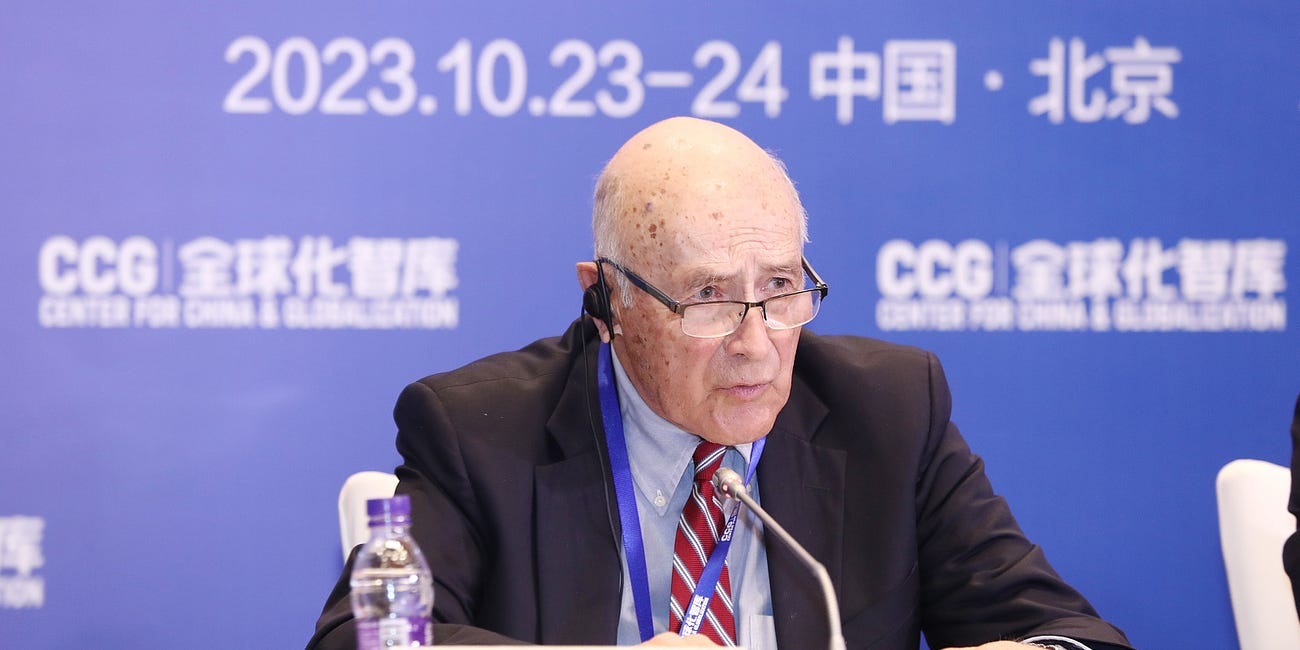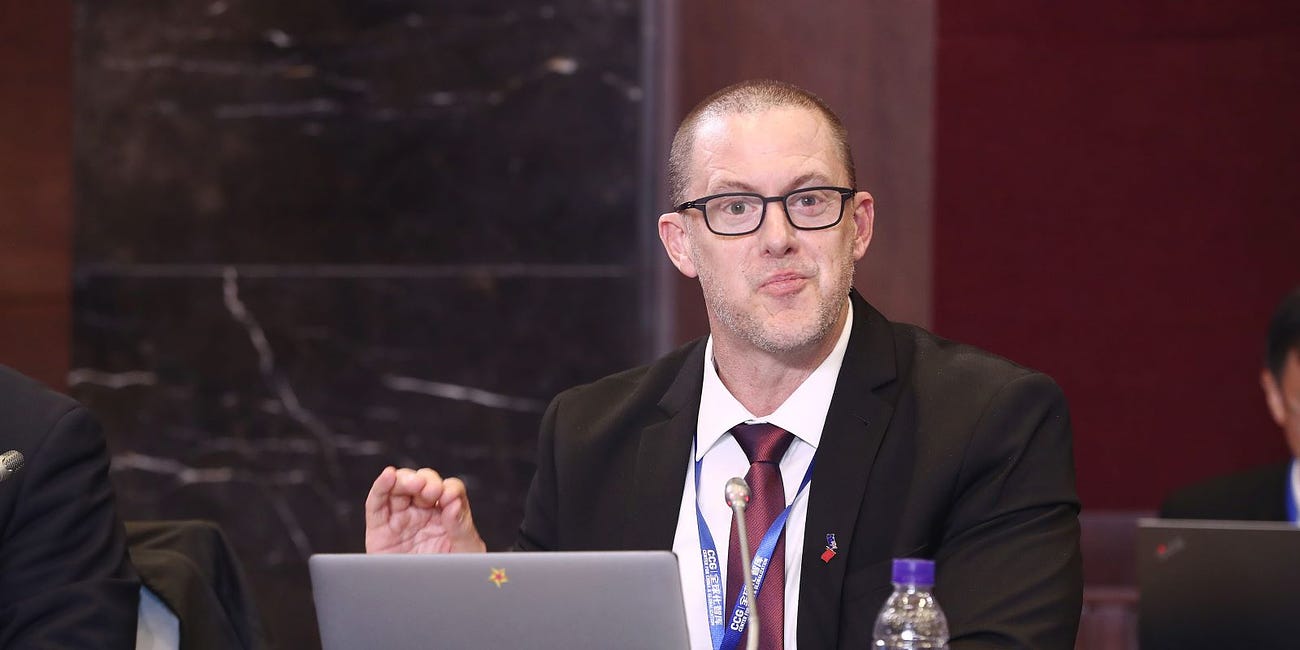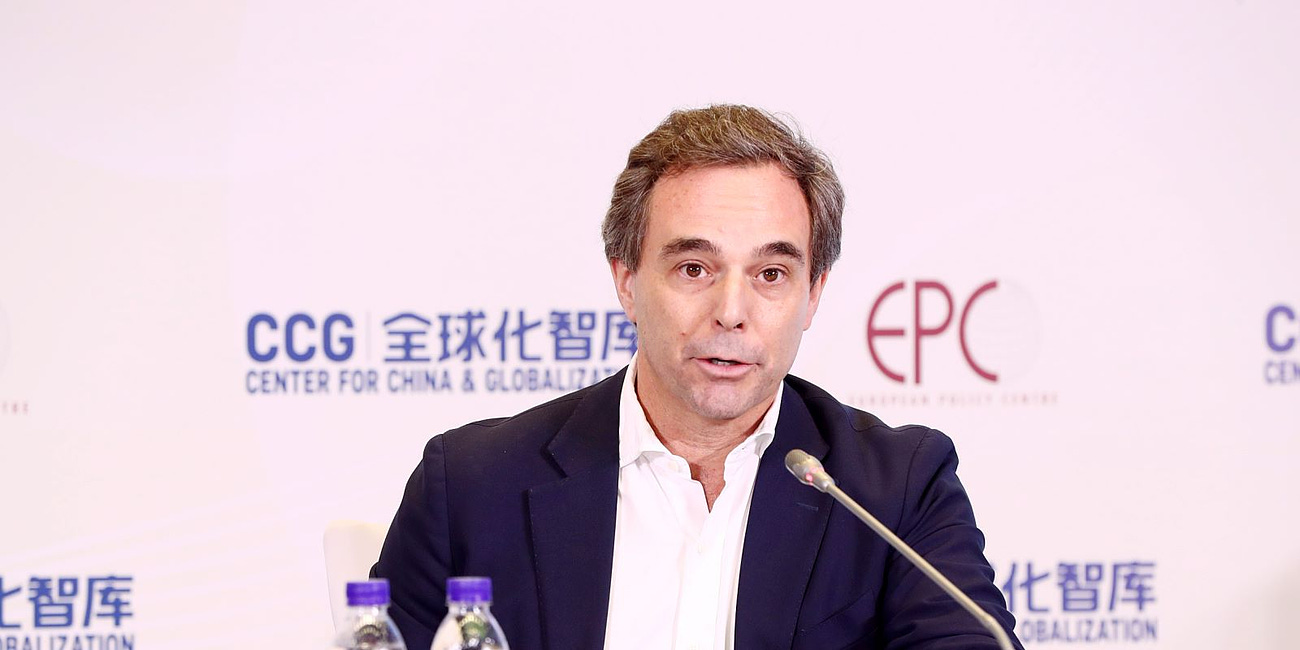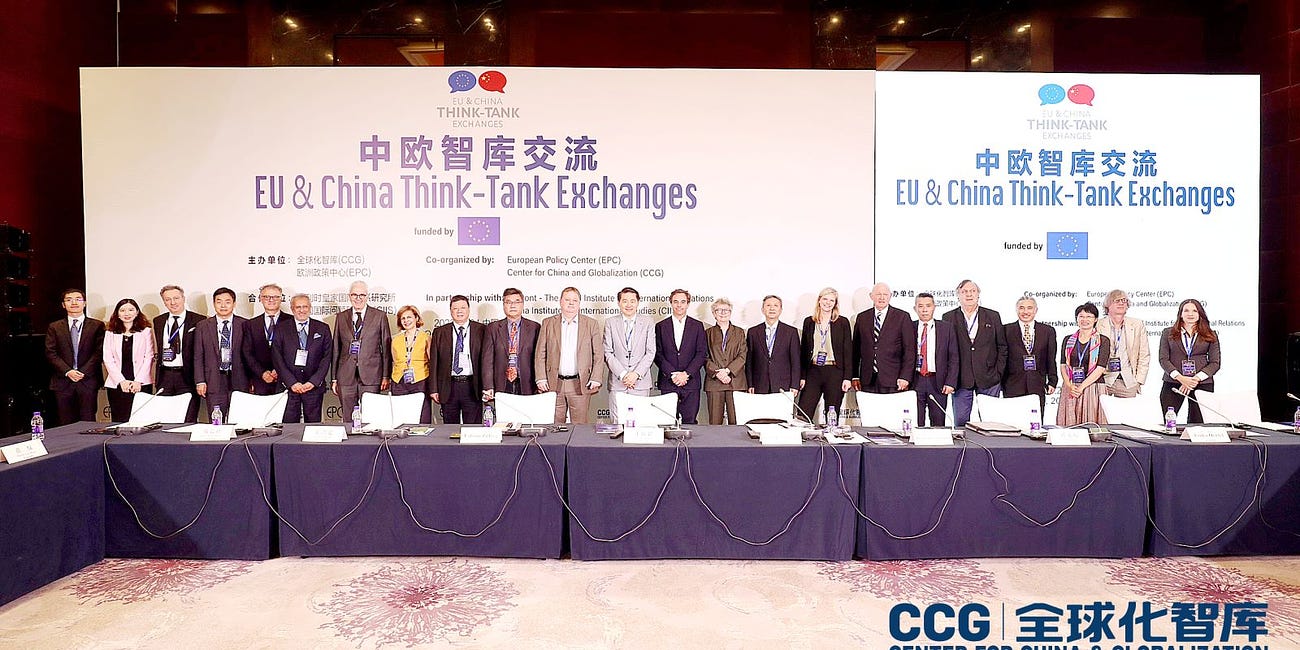Part I of Global Order at A Crossroads: Transcript for CCG's global think tank forum
Rong Ying, Colin Bradford, Fabian Zuleeg, Khalid Al Khater, Erik Solheim, Chen Wenling, Mohamed Amersi discuss rising pluralism, shifting global order, and new approaches to global governance.
The following is Part I of the transcript of "The Global Order at A Crossroads: Ways Forward" roundtable from the 8th China Global Think Tank Innovation Forum. The roundtable was the second part of the Forum, following opening remarks by the heads of two organizers of the forum and two other Chinese guest speakers.
The forum was organized by the Center for China and Globalization (CCG) and Chinese People's Association for Friendship with Foreign Countries (CPAFFC), supported by the Academy of Contemporary China and World Studies (ACCWS), China-United States Exchange Foundation (CUSEF), and Konrad-Adenauer-Stiftung (KAS), in partnership with China-West Dialogue (CWD).
The forum was covered by the People’s Daily, Xinhua News Agency, Global Times, and Guancha, among other Chinese media outlets. The full video is available on YouTube. It was also broadcast online by CCG and remains available in China both in English and Chinese.
Please note that this transcript is transcribed by CCG from the audio and video recordings and may contain errors. It hasn’t been reviewed by the speakers. CCG will share the rest of the transcripts in the following days.
This transcript covers 7 speakers:
RONG Ying, Vice President of China Institutes for International Studies (CIIS)
Colin Bradford, Nonresident Senior Fellow of the Global Economy and Development Program, The Brookings Institution; Co-Lead, the China-West Dialogue
Fabian Zuleeg, Chief Executive and Chief Economist, European Policy Centre (EPC)
H.E. Dr. Khalid Al Khater, Director of Policy Planning Department at Ministry of Foreign Affairs, State of Qatar
Erik Solheim, Vice Chairman, Europe-Asia Center; former Under-Secretary-General of United Nations
CHEN Wenling, Chief Economist, China Center for International Economic Exchange (CCIEE)
Mohamed Amersi, Founder and Chairman of the Amersi Foundation
Three speeches by Michael Pillsbury, Joseph Nye, and James Laurenceson, respectively, have already been published on CCG Update or Pekingnology.
RONG Ying, Vice President, China Institutes for International Studies (CIIS)
Thank you very much, Professor Wang. It’s really a great honor and privilege to speak as the first speaker. But I feel really overwhelmed by such a big issue; I don’t think we’re going to solve it in three minutes. Fortunately, I think the last weekend, actually, we, together with colleagues from the United States and others, discussed a little bit. So, let me very briefly make three points. One point, one minute.
First point is that it is indeed, as Professor Wang said in his opening remarks, that the current international order, whatever you call it—rule-based liberal international order—is not sufficient or effective enough to address or provide answers to the challenges or problems that we are having. Now, what would be the way out, as I think is the theme of this session? I think there are several possibilities: one is something like we call bifurcation, represented by the United States, China, or others. I think this is not a good alternative, and we may all agree. The second is, of course, related to the fragmentation of international politics. The last one, which I feel we may agree on, is let's work hard to strive for a new international order that is more just, democratic, and inclusive.
The big question actually is, which leads to my second point: I think this is, we have to be purposeful. That is, what will be the purpose of this international order? I think we all agree the current international order, whatever deficiencies, or problems it has, has helped in some way to maintain peace, stability, and development, but the problem is how. So, I would quote a vision, I think, just provided by President Xi in his remark statement at last week's BRI Forum: that is, let's see if we can work out or strive for an international order that will help to build, to promote a global modernization of peaceful development, mutually beneficial cooperation, and prosperity for all. Now, that is to say, what will be China's vision or China's plan for that? And I would again conclude my remarks in thirty seconds by highlighting a formula I believe that can be simplified, that is "1+2+3".
"1" is a concept, that is a community with a shared future. "2" is two platforms for China to strive for: a Chinese approach to modernization and also, I think, the BRI, now we call it high-quality cooperation for BRI. "3" is, of course, the three "G" which you have to take in a holistic way: global development, global security, and global civilization initiative. And I think China is open, China is ready, and China certainly will work very much together with the entire community to implement and put this vision into action. Thank you.
Colin Bradford, Non-resident Senior Fellow, Global Economy and Development Program, The Brookings Institution; Co-Lead, China-West Dialogue
Henry, thank you very much. It's a real privilege to be here at this first in-person large think tank gathering in China. I hope we can do the same in the United States. As has already been said, the China-West Dialogue, which I founded four years ago with ten other people from Europe, Canada, the United States, China, and Chile, has had now thirty Zoom sessions over the last four years, involving sixty people from seventeen countries. And the essential message of it is pluralism. Pluralism is the dominant geopolitical dynamic in the world, we think. Pluralizing the toxic US-China relationship by the participation of Europe, the global south, and middle powers around the world is the way to embrace the complexity of relationships and approaches to issues, which can then lead to the professionalization of the dialogue rather than polemicization of it, which the binary bipolar US relationship tends to do. So, it's a way of inserting, in between these two powers that are having some difficulties relating to each other, countries with other interests, other perspectives, and that's precisely the diversity of perspectives, which has the power of this idea to pluralize, diffuse, and professionalize the relationship. So, I'd like to ask the staff, if they would, to put up four examples and rotate them through as I'm talking, of where pluralization, pluralism, and non-alignment have fit into the world. Stunningly, I've come upon a report that's just been released in Japan, which will be one of the things that will appear on the screen, written by, or led by, Yoshihide Soeya, and Mike Mochizuki, who I have known and worked with in the nineteen eighties when he himself was at Brookings. I'm gonna read you the first paragraph of this because I think it reflects precisely, Henry, the crossroads theme that you... and the way forward. And it stunningly comes from Japan, who normally you would think would be in lockstep with the United States, but the whole idea of pluralism is one, as an American, that I think is actually in the US interests. So, here's how they start. This is the opening two pages by Mr. Soeya and Mike Mochizuki: "In 2018, we convened the Asia’s Future Research Group because of concern about the intensification of US-China geopolitical rivalry and the increasing risk of military clash in the Asia-Pacific region. The lack of balance in Japanese public discourse about how Japan should address this evolving strategic environment in Asia deeply troubled us. We saw that not only Asia’s future but also Japan’s future was at a strategic crossroads. We therefore invited scholars and experts on Japanese foreign policy and international relations to join a multiyear project in order to develop a realistic and moderate Japanese strategy for Asia. The shortcomings of the national security strategy adopted by the Kishida cabinet in December of 2022 confirmed the urgency of this task and the need to chart an alternative course for Japan." So, this is differentiation in the strategic policy of Japan, which normally you would think would be in lockstep with the US. And I would argue that's in the interest not only of Japan but of the United States and of China because it helps to pluralize and diffuse the tensions that are driving, and worst of all, dominating the public discourse in global arenas such that global governance stalls out.
So, Henry, you've talked about this; businesses worry about reputational capital. Reputational capital, you probably would understand, is that if a firm produces a product that actually does the opposite of what it's supposed to do, somehow, their brand name suffers. I think one of the conclusions we've come to in the China-West Dialogue over these four years is that the reputational capital of the US and China is suffering because of the tension, drama, the relationship, and the narratives around it. So, I think there needs to be a shift in that. And one way to think about it and try to induce changes within both Beijing and Washington is to realize that the reputational capital of both countries would be enhanced the more we are able to demonstrate to the world that we are working together for the good of not only our own relationship but the world as a whole and not just going at each other because of value differences or ideological differences, or what I think are false formulations of binary choices between state and market, between democracy and autocracy, which are basically destructive ways of framing the issues. The issues are much more complex. So that's the basic point.
Fabian Zuleeg, Chief Executive and Chief Economist, European Policy Centre (EPC)
Thank you very much, and I'm very happy to be here for the eighth China Global Think Tank Innovation Forum and also tomorrow's EU-China Think Tank Exchanges. I want to give a special thanks to CCG, and in particular, Henry, for the invitation but also for the cooperation, which has been extremely productive. We've already heard from Henry about how we live in more challenging times, so I think it's even more important to have frank and open exchanges and to foster mutual understanding. I hope I will be able to contribute a bit to the understanding of what is happening in Europe, what Europe's priorities are in this challenging environment. Of course, I do not represent Europe, but I believe what I'm saying is the consensus view not only in the EU institutions and Brussels but also in our member states.
For Europe, the world changed with Russia's invasion of Ukraine because it's questioning the basic tenet of European integration that economic interdependence guarantees peace. So Europe is questioning this economic interdependence paradigm, and whether it has to be tempered by the geopolitical realities which we are facing. Europe wants to avoid geopolitical fragmentation; it wants to continue to foster open trade, promote multilateralism, and international law, all of which principles China shares. So, we are very much seeing there's a common scope to work together.
But for Europe, supporting international law must also mean supporting Ukraine to defend its territorial integrity. Europe is doing that in conjunction with the US, not coerced by the US. At the same time, the EU is developing new mechanisms and new instruments to deal with major transitions: demography, technology, and sustainability, all of which are clearly also on the agenda not only of China but on the global agenda. These instruments will inevitably have an impact on the EU's relations with the rest of the world, but not only with China, also with the US, and the rest of the world. What I would emphasize is that these mechanisms being developed should not be understood as protectionism aimed at certain countries. They are mechanisms to try to deal with common global challenges, and I would argue that in those areas there is a lot of scope for cooperation and common working. We definitely need that cooperation, the global understanding, the dialogue, so I'm very happy to be here to contribute to that. Thank you again for inviting me.
Khalid AL Khater, Director of Policy Planning Department, Ministry of Foreign Affairs, State of Qatar
Colleagues, friends, esteemed participants, let me start first by thanking the organizing body, CCG, and its founder and president, Professor Wang, for inviting me to participate. I look forward to a fruitful discussion ahead.
This conference represents a very important platform for voices not only from this region but for leaders of thought from around the world to interact, better understand, and develop ideas that help us address challenges. The global order stands at a critical juncture. We meet today in difficult times unfolding in our region. Recent events underscore the urgency of reevaluating the international system. With this devastating humanitarian toll and displacement of the population, the current crisis in Gaza cannot be viewed in isolation. It is a stark reminder of the double standards and the lack of justice in the international system. In particular, the crisis has far-reaching implications for global governance at the forefront, which is the fragility of our regional politics. The decentralization of world politics is not a specter on the horizon, but a present shift. Today, across the globe, there are more centers of influence, each with political, economic, military, and technological strengths. Additionally, international stakeholders are contending with the rise of a more active role for regional actors, adapting the fundamentals of multilateral and bilateral international relations. These actors can more effectively contribute to de-escalation and regional stability. In Qatar, we have always been global advocates for the peaceful resolution of conflicts and disputes. Our foreign policy is balanced by mutually beneficial relations with countries alike. These relations help us host and mediate when our partners need our aid, and we will continue to carry out this role for the common good. In our role as a convenient power facilitating peaceful dialogue, we see the flux in the global order and recognize the importance of continuing to work for an inclusive, more balanced, resilient world through proactive international engagement and continuous investment in global partnerships. We strive to bridge divides and contribute constructively towards peace, security, and prosperity.
The current crisis in Palestine and Israel, and the devastating loss of life among civilians, accentuates the dire and urgent need for such a peaceful resolution. Although this might seem a very local conflict, its potential to spiral regionally and beyond can happen at any moment in time.
Thought leaders and think tanks serve a crucial and ever-growing role to inform and influence global policymakers in different areas. I believe that think tanks in this region of the world must closely cooperate with their counterparts in the Middle East to better aid policymakers and advance the existing flourishing relationships, not only bilaterally but multilaterally as well.
In conclusion, the path ahead is as complex as ever, demanding concerted efforts. Such efforts, however, offer the best hope for a renewed, open, and more importantly, a balanced rule-based international order that does not advocate the interest of one grouping at the cost of international stability and norms. Indeed, we should subscribe to a vision of a shared and responsible future, an approach that Qatar has called for repeatedly. Our upcoming Doha forum, which you mentioned, indeed has the theme this year of shared responsibility. Through our shared responsibility, we can build towards the prosperity and stability of all. Thank you.
Erik Solheim, CCG International Council Member; Vice Chairman, Europe-Asia Center; former Under-Secretary-General of United Nations
Thank you so much, Henry, for bringing us together, and I'll go straight into the matter. I believe that the twenty-first century should be based on two verbs. One is "respect." We need to respect each other across civilizations; and the second is "dialogue." Whenever there is a problem, we need to have a very detailed, strong dialogue.
Look at the one and only strong ideology in the twenty-first century: nationalism. No one all over the world really believes in any other ideology at the moment. In India, Prime Minister Modi is seeking the roots of Indian Hinduism. In Turkey, President Erdogan is seeking the roots of Turkey in Islam. In China, it's becoming more Confucian as far as I can see. European and Americans tend to be a little bit more inward-looking in the last decades. So everywhere, nationalism, the strongest of all ideologies, is already deciding the decisions of political leaders.
But that happens at a time when the world is moving into multilateralism. We will never ever be in the nineteenth century, which was European, nor in the twenties, which was American. Now we have Europe, we have India, we have Turkey, Brazil, we have Indonesia. Indonesia will become the fourth biggest economies, as I've heard, by 2050, and of course, among all these powers, the two most important are the United States of America and China. So how can we manage this? We need a balance between globalization and nationalism; otherwise, we will fail. The biggest burden falls on the United States of America.
The United States needs to understand that the world is changing very fast. The time is gone where the United States can dominate the world. When you follow foreign policy debates in the United States, there's not a single square meter of land that isn't a major American security interest. How can there be any peaceful land in the Pacific where every bit may be "oh, it's so important for America." If other powers took that view, it would be a recipe for disaster. The United States needs to accept that China is now an equal power and that the United States needs to maneuver in a multipolar world.
When it comes to China, I believe that China can also be a little bit more pragmatic, particularly understanding that China is not so big, so powerful, so all-important to the world. When it comes to conflicts and quarrels with smaller nations, say the Philippines or Vietnam, and even India, maybe China could be a little bit more pragmatic, a little bit humbler, and a little bit more accepting of the views of the other party. But again, the biggest responsibility lies with the United States, but China can also do more for the multipolar world in the age of nationalism to work.
The second issue is business. There are very few people from business here, but it's the center of a lot of what we need to do. In business, we need a balance between competition and cooperation. Cooperation, we all understand, is essential. But competition is also good. For instance, when all the European and American automakers this year have realized how far ahead China is, and how Chinese automakers are far ahead of the European and American companies, it's very good for competition. European and American car makers understand that they need to get up early in the morning and work hard to compete with China. So, we should have a balance between competition and cooperation. We need more European and American investments in China, more Chinese investments in Europe and America, and, of course, in all other parts of the world. Europe, and particularly America, need to get out of the zero-sum idea that whenever there's a benefit for one, there's a disadvantage for the other. On most issues, there are mutual benefits. China is rising; okay, it's a better economy for basically everyone. But China can also do more to ensure that European and American companies are treated fairly in the Chinese market. A European or American company that is successful in China is one of the best bridges across the divide because that company will be a strong voice for a good business relationship. So, China should do more to ensure that all European and American companies feel fairly treated and have access to the Chinese market, where, of course, the West needs to do exactly the same with companies from China.
Finally, the environment is an obvious area for cooperation. No one disputes the need to cooperate on the environment. It's a kind of soft issue where we can easily cooperate. So, let's use the environment, and that's where the Belt and Road's "Green Coalition" represents, and Europe-Asia can also come into play. How can we use the environment as a standalone issue essential to everyone but also as an area that is a soft bridge for cooperation across the divide between China and the West?
Finally, again, I believe if we base the twenty-first century on these two concepts: "respect" and "dialogue," we will do very well in the decades to come.
CHEN Wenling, Chief Economist, China Center for International Economic Exchange (CCIEE)
Looking ahead into the future and addressing the intertwined challenges of our world, we must propose thoughtful and insightful suggestions. I'd like to focus on four major global issues that are influencing the world order. It is vital for think tanks to reach a consensus and serve as anchors for a more fair and reasonable global order.
We are at a critical moment, deciding whether the world will choose peace or war. There is a potential onset of a new arms race. For instance, the U.S. defense budget has recently increased from over 800 billion to an additional 100 billion, Russia's defense budget is set to rise by 70% in 2024, Ukraine's military budget will account for 50% of all budget expenditures in 2024, and many countries, including Poland, Turkey, and Italy, are boosting their military spending. Such an escalation in defense expenditure is a driving force pushing us towards war, resulting in devastating consequences for numerous nations, wrecking their economies. The United Nations Charter begins by expressing the determination to "save succeeding generations from the scourge of war, which twice in our lifetime has brought untold sorrow to mankind." Hence, think tanks must reach a consensus to promote peace.
The world is currently facing a developmental bottleneck. Should we maintain global development collectively or further fragment economic globalization by building barriers? This is a crucial topic where think tanks must form a consensus. António Guterres highlighted at the 18th Belt and Road International Summit in China that the Belt and Road Initiative brings hope and progress to billions worldwide. President Xi Jinping proposed eight action initiatives during the conference, the first of which was to build a multi-dimensional network of connectivity. The world needs more interconnectedness, not barriers. With China partnering with over 140 countries, efforts to promote policy coordination, infrastructure connectivity, unimpeded trade, financial integration, and people-to-people bonds aim to prevent global fragmentation.
The ecological crisis is pressing. Do we continue to sacrifice the sustainable development rights of future generations for the immediate welfare of the current generation, or do we self-reflect and prioritize ecological preservation? The Chinese government has taken a distinct path in green development. Not only has China made dual carbon commitments, but 25% of the world's newly green areas, as observed by NASA, originate from China. China is home to 13 of the world's major wetland parks and prioritizes low-carbon, green, sustainable development, setting it as a binding target in its five-year plan. As a result, renewable energy now accounts for nearly 30% of China's total energy, and this figure is expected to rise.
Global order and governance issues need addressing. Will we prioritize the interests of one country over others, or will we uphold global order and rules to foster collective development? We observe that 16% of the global population resides in developed nations, whereas 84% are in developing countries. There is an evident wealth gap with rich countries getting richer and poor countries getting poorer. According to Forbes' top 2000 companies, U.S. companies dominate multiple sectors, reflecting their competitiveness but also indicating wealth concentration. Hence, we must contemplate the kind of world order we aspire to – one that benefits the majority or continues to favor the wealthy.
Reaching a consensus on these issues and forming public opinion is crucial for the global crossroads we find ourselves at. Thank you all.
Mohamed Amersi, Founder and Chairman, Amersi Foundation
Henry, distinguished guests, ladies, and gentlemen, thank you for inviting me to such a gathering. It is a pleasure to be here in Beijing.
Once again, it has been said that there are decades when nothing happens, and then there are months when decades happen. We are at an inflection point where the world order in which I was born is going through a tectonic shift, one in which we are likely to see a world in chaos and disorder before a new order is born. Questions facing global leadership include whether this transition will embrace a global conflict, following which there will be a reset, or will it be approached via gradualism, a phenomenon which Western powers have employed to instill free market, liberal democracy in the developing world, but have largely failed because of their uneven application and refusal to accept its outcomes. Nonetheless, I would hope for gradualism than a Big Bang. This will give time for competing powers and their visions of a new world order to fully understand each other and to conclude that there is more that unites us than divides us, with respect to the existential threats that we are facing, including nuclear non-proliferation, climate mitigation, and resource scarcity.
But the wars in Ukraine and the Middle East have shown that we could well see a global conflict before a reset. Some would argue that such a conflict is inevitable, but can it be contained so that it does not become existential? Although not ideal, a favorable outcome would be one where conflicts are localized and somewhat asymmetric in nature.
But what sort of global order do we really want to see emerging out of all this? The knee-jerk response is that it could be bipolar, with the rise of China competing with the US: a new Cold War. But nobody knows. I hope, maybe in vain, that it will be a multipolar world, where military might, economic might, technological might, by which I mean AI and cryptocurrency, and environmental mitigation could be led by different powers in a collaborative manner.
An extension of this blue-sky scenario could also see the emergence of what I believe is the future, which is global netizens, global citizens of the net, transcending all borders and barriers. Whether we transition abruptly or gradually, it is clear to me that many institutions and instruments devised after World War Two are largely not fit for purpose, e.g., the UN Security Council. The World Bank and the IMF are largely seen to be supporting democracies of the rich, by the rich, and for the rich, and the alternatives are at too early a stage in their development to know how sustainable they are. Canceling existing institutions is an option, as no one will voluntarily give up power, and therefore only marginalization into irrelevance seems to be the prevailing way forward. Based on present trends, it seems to me that a shift in the balance of global power could impose a new order that is not driven by ideology or geopolitics or bloc politics, but one where the focus will be much less on military, security, and sanction-centric concerns and more on economic and development-centric ones. And, of course, it needs to be de-dollarized.
I come from the world of business, and a key metric employed to measure success is return on investment. The West has invested $4 trillion in fighting the War on Terror, of which $3 trillion was invested by the US alone, whereas China invested only $1 trillion in the Belt and Road initiative. And it's not rocket science to conclude that if success is measured solely by friendship, collaboration, and economic advancement, then China has the edge. Any recognition of this conclusion, though, will require a recalibration of the prevailing, diametrically opposite views of world order and the system under which society is organized and governed. At the very least, better alignment and collaboration, through dialogue on security, technology, the environment, prosperity, and empowerment, will be imperative.
To get there, we might initially see power shifting from the global institutions that I was brought up under, to fragmented, but nonetheless more solidified and effective arrangements with an expansionist mindset, such as the G7, NATO, and EU on the one side, and the Shanghai Corporation, BRICS, ASEAN, and Belt and Road, etc., on the other. Later on, the African Union, the GCC, and the Commonwealth, and we can see the complexity with which we have to grapple. Relationships are now more transactional than ever before. They will be offering competing visions of a new world order, but only a major reset will dictate which prevails. For now, it looks like the chips might just favor the globalizing South, as opposed to the nationalistic North. As for my own country, the United Kingdom, unfortunately, for now, but hopefully not for too long, we are busy scoring own goals, as we are unable to reconcile the past which we cannot forget, with a future which we cannot control. Thank you very much.
Again, this transcript is transcribed by CCG from the audio and video recordings and may contain errors. It hasn’t been reviewed by the speakers.

